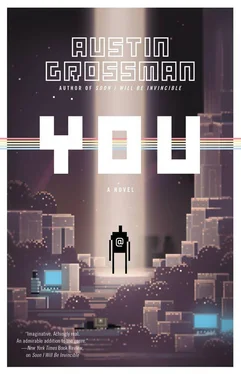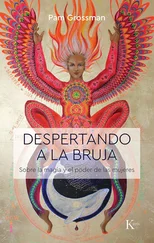“Are you cold?” I asked. “I have a jacket.” The armor left her arms bare, not to mention her midriff.
“No,” she said. She tapped a silver armband against the metal table. This might not have been the best venue. The Garage was crowded with college students on Thanksgiving break.
The waitress brought our menus.
“Just order anything,” I said. She looked at the menu for a few seconds before laying it back on the table.
“I can’t read,” she said quietly.
I ordered a Diet Coke for me, plum wine for her, and pho for both of us. Leira wore her black hair up in a topknot tied with braided cord. She was physically intimidating, perfectly muscled, except that up close she had the beginnings of crow’s-feet near her blue eyes. She looked beautiful, although at life size her poly count was a little low.
“So,” she began. She looked around the room. I guessed that she was a little uncomfortable with noncombat situations. “What is it you do? You’re a scholar? Or a clerk?”
“Formerly.” I hedged. “I’m still figuring it out. I’m only twenty-eight.”
“Ah,” she answered. “I’m twenty-two.” I guessed that in a medieval world, twenty-eight was a pretty advanced age. I should probably have my own township by now. Leira, of course, had been twenty-two for a dozen years now. She’d also killed about a hundred thousand people.
“And then you’re a, um, warrior princess?” I asked.
“That’s right.”
“And how did you get into that line of work?”
The food arrived; she ate like a princess turned nomadic warrior, and then we chatted. Adventures she’d had; which weapons she liked (cavalry saber, compound bow) or hated (morning star, crossbow); the current stealth system (hated it). She told me her origin story, the real one, the one that doesn’t show up in any manuals or cutscenes. I paid for dinner. She offered, but the waitress wouldn’t accept rubies or gold armbands.
Afterward we walked down to the river and looked at the moon. “Only one?” she said.
“Only one,” I said. They’d given Endoria three. They’d made Endoria better. It was better, I thought.
“Leira, what do you know about Mournblade?”
“They say that when Mournblade is destroyed, this age will come to a close and the world will be reborn.”
“But what happens then?”
“The Fourth Age, silly. The Age of Humankind.”
“That sounds a little sad, actually.”
“Well, Prendar’s not a fan.”
I walked her back to the portal: a flat oval that hung next to the Harvard Square T stop. On the other side, blocky white clouds drifted past on a summer’s day; green polygonal hills adorned the horizon.
“So. This is good night,” I said. “Is that home in there?”
“I can’t go home, you know that. They’d never take me back. Also, my men burned it down.”
“What do you want, Leira?” I asked. “Really want, you know?”
“I used to want to get married,” she said.
“I’ll marry you.” I said it without thinking, but I would have.
She shook her head.
“I don’t want to marry you. I want to keep robbing and murdering the people who should have protected me in the first place. I want to burn things. Can’t we just do that?”
We shook hands. Her palm was small and rough, like a workman’s. She was silhouetted against the bright Endorian day with the warm wind coming from behind her.
“Look for me,” she said. She kissed me on the cheek, then stepped through the portal and vanished, onward to the next adventure.
Walking home, I remembered a story Lorac had told me months earlier. Late one night, sitting up over a skull-shaped chalice of wine, he’d claimed that long ago, human beings and video game characters were all part of a single mighty race of glowing, immortal wizards and warriors. Even the gods feared us, so much so that one day they joined forces against us and after a long struggle defeated us.
To forestall any future threat, the gods decreed we should each be separated into halves, and each half hurled into a separate dimension. There was a human half, weak but endowed with thought and feeling, and a video game half, with glowing and immortal bodies that were mere empty shells lacking wills of their own. We became a fallen race and forgot our origins, but something in us longed to be whole again. And so we invented the video game, the apparatus that bridged the realms and joined us with our other selves again, through the sacred medium of the video game controller. The first devices were primitive, but every year the technology improved, and we saw and heard and sensed the other world more clearly. Soon enough we’d be able to feel and smell and taste and live entirely in our own bodies again. And on that day, he finished portentously, we’d challenge the gods once more.
“First of all,” I said, “you ripped that whole thing off from that story in Plato. Except it’s supposed to be where love comes from, whereas yours only explains video games. Second of all, video games weren’t even invented until 1965. How could there be video game characters before video games existed?” Lorac only shrugged and looked at me through the darkness with his glowing eyes, which was a surprisingly effective retort.
Leira and I couldn’t get married, not even in Massachusetts, although I could ask Toby to write the code. But I suspected in my heart it wouldn’t work. Maybe I was only really attracted to Leira because I liked ranged combat and procedural fire, and because I wanted to kill and kill and then ride for the horizon as she did, hair streaming in the wind. Maybe we were two halves of a sundered whole, a single eternal hero for the ages, till death do us part.
The conversation was happening on the other side of the cubicle wall.
“So AstroTrade disappeared, but its assets were bought by Paranomics. They say they found our name in a text file in the software package and tracked us down.”
“But how did we manage to lose their hundred million dollars or whatever the fuck?”
“They were using prediction markets to drive high-frequency trading software. You know, the stuff that does trading without you. The funny part is that it was kind of working, but now it’s not. What?”
There was a noise that at first I thought was a chair creaking, or maybe a record skipping. I got up and rounded the cubicle divider to see Lisa sitting in her chair, bent over and hugging her stomach, her long hair brushing the carpet. She was, I guessed, laughing, but she wasn’t very good at it.
After a few moments she managed to croak the words, “It worked. It worked.”
“What worked?”
“I guess now we know why Darren sold his shares,” said Lisa.
“Let’s go into my office,” Don said.
We did. Don closed the door behind us, which must have been noticed. A closed-door meeting at Black Arts was almost unheard of.
“Oh, God, I think I’m the only person now who knows this,” Lisa said, leaning against the door. “You don’t even know what the funny part is.”
“I would love to know about the funny part,” Don said.
“AstroTrade didn’t just lose its money on Black Monday. I think they may have caused Black Monday. And that’s even not the funny part.”
“That’s impossible,” Don said.
“We have to go back. So AstroTrade… 1987 was the early days of automated trading programs. You know, people think they have software that knows when the market is right to make a particular trade, and can do it faster than a human can. A hundred times a second if it wants to, way faster than a person can keep track of. Everyone was excited. All you need is the magic algorithm; you set it loose in the markets and it generates money. It would be like the philosopher’s stone.”
Читать дальше





![Ally Carter - [Gallagher Girls 01] I'd Tell You I Love You But Then I'd Have to Kill You](/books/262179/ally-carter-gallagher-girls-01-i-d-tell-you-i-lo-thumb.webp)






